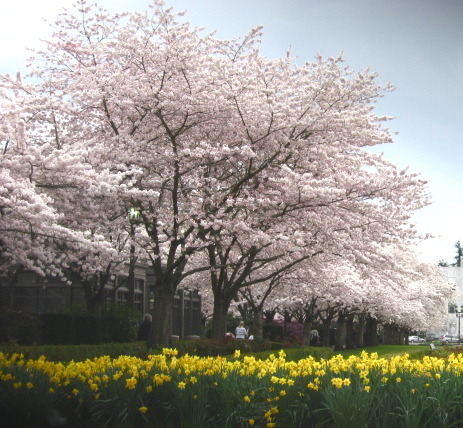S. Smith's Blog, page 30
March 29, 2013
Spring
I need a poem for spring
I check my chapbook—the one I wrote
two years ago.
I look under my bed;
wander through the house,
searching.
And through each window
the rising sun peeks.
It’s out there—I know it—spring.
Pungent daffodils such bright
yellow you expect them to
rub off on your hands
Soft pink blossom sea
against robin egg blue sky
chirping birds
just beyond sight
silly gray squirrel still
trying to find last fall’s nuts,
upturning newly sprouted
radishes in the process.
Somehow this acrid brown coffee
in my hands seems out of
season—too much winter
“Out!” she calls
“Mow the grass, take a walk,
smell the air of a new season
dig in the dirt
spring is here
Come out
Come out!”
(This is not necessarily the final copy, if anyone has any suggestions…)

March 17, 2013
Gardening Fiction for Spring
Big Ag Has Won the War On Food
In New Middle Grade Series
New book series imagines a future where gardening is illegal
SALEM, Ore. March 17, 2013—In S. Smith’s exciting new dystopian series, Seed Savers, corporate agriculture and the government have merged into one controlling agency—GRIM. Gardening and seed ownership is illegal, and the population eats a dumbed-down, processed version of food.
In the not-so-distant future of Seed Savers, an elderly woman begins mentoring three children in the “old ways” of gardening. Things go awry when their mother is jailed for the illegal tomato plant the children have secretly been growing, causing them to bolt. With only their bikes, a little money, and backpacks, the kids begin a lonely cross-country journey that tests them both physically and spiritually. Will they succeed in their quest to find a place of food freedom? And can they, only children, help change the world?
Smith, a gardener and former middle school teacher, wanted to write a book students would enjoy and that could be used in the gardening classes and clubs currently popular across the country. Raised on a small family farm, Smith still freezes and cans “boatloads” of fruits and vegetables each summer and fall. “Seed Savers is a love story starring homegrown food … politics obviously comes into the book, but it’s much more than that,” she said. When asked if the novels have a message, Smith said, “… the main message is that kids (and grown-ups) can make a difference in their world.”
Though written for children, adult readers also enjoy Seed Savers, describing the series as well-written, fast-paced, thoughtful, and unique. Home gardeners everywhere will want to get a copy of this simple, yet elegant, work of fiction.
Seed Savers: Treasure and Seed Savers: Lily are available online in paperback and Kindle editions and can be ordered through your local bookstore. Book 3, Heirloom is scheduled for release in fall 2013. For more information visit http://seedsaversseries.com.
# # #
Contact Information

March 13, 2013
Write A Letter, Part 2 (Or Where has all the stationery gone?)
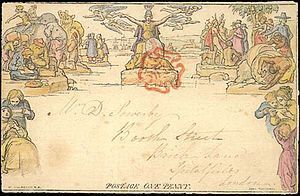
A hand-colored Mulready envelope (Photo credit: Wikipedia)
Yes, you. Write a letter (pen on paper; maybe even cursive if you know how). People will love you for it. Really. I got an email from someone recently who noted, “It was good to get a handwritten letter from someone.”
What’s funny is I don’t think I sent much of a letter; I was sending a check, and because the receiver was a relative, I jotted down a bit else of what was happening with our family.
I’ll admit, I rarely write letters anymore. Mostly at Christmas time, and then more often than not, I send a blanket newsletter–although I usually add a few extra personal handwritten lines at the end.
BUT, I am a letter writer from way back. I was a child when I started writing letters—nine, ten years old maybe. I wrote to my school friends when they moved, to an older cousin who lived far away. When I went away to college I wrote my parents, my grandma, my great-aunts, people from church. In the 1980s when I lived in China, handwritten letters were my lifeline to family and friends so very far away.
I loved stationery and pretty stamps. I was a big spender when it came to a stationery catalogue company to which I subscribed; a collector of anything new and different or that tickled my fancy. I especially liked if the matching envelopes were particularly wonderful—sometimes transparent, other times just amazingly cute. One time I got some cards which included beautiful little black and white guinea feathers. My cache of cards and stationery lasted decades (not because I didn’t use it, but because I ordered so much on a regular basis.)
But now it’s gone. And guess what? I cannot find stationery anywhere. I have visited most of the big stores in my area–some of which have entire aisles labeled “stationery.”
But what do I find there? Blank notecards, narrow to-do list pads, thank you notes, empty journaling books, decorated printer-sized paper. It’s not what I want! I do not want printer paper and to-do lists. I want stationary, maybe 5 ¾ by 7 ½ or 6 ¼ by 8 ½. Simple but cute stationery with sweet matching envelopes.
After coming up empty in the major stores, I’ve started scouring thrift stores. What have I found? Notecards, blank books, decorated printer-sized paper.
How will we save the post office if we can’t even find stationery? Yes, I know, there’s always lined notebook paper—but that’s so school! And blank cards? So limited!!
Give me back my stationery.
The hunt continues.
In the meantime, write someone a letter. I know you can do it.
S. Smith is the author of the awesome middle grade series, Seed Savers. Visit her Pinterest and Facebook pages.

March 6, 2013
Seed Savers Book 2 - Lilly by S. Smith
 Reblogged from This Kid Reviews Books:
Reblogged from This Kid Reviews Books:
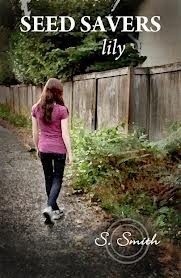

Seed Savers Book 2 - Lilly
by S. Smith
196 pages - ages 9+
Published by Sandra L.\Smith on November 16, 2012
Lily lives in the United States but it is a different world than what we know. People are not allowed to grow their own food or even to own seeds or plants. The government controls all the food. Lily was sad when her friends Clare and Dante ran away to Canada.
Thanks, Erik ("This Kid")!
March 1, 2013
Write a Letter, Save a Postal Service
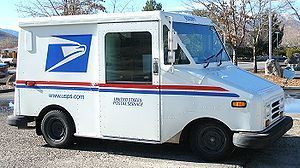
A small United States Postal Service truck seen in Carson City, Nevada. The USPS often uses these smaller vehicles in suburban areas. (Photo credit: Wikipedia)
So, I read a headline in yesterday’s paper (yes, the actual paper–the kind you hold in your hands with a mug of coffee on the table next to you) : Postal Services Across Globe Struggle with Lower Demand. Among the points made was that although internet shopping is “helping keep alive moribund postal services across the developed world…the core of their business–letters–is declining precipitously and…parcels alone wont’ be enough to save them.”
Say it ain’t so! I cried. Okay, so I actually texted that sentiment to my sister when I first heard about the Saturday delivery being discontinued here in the States. Her snarky reply: “It ain’t so.” Oh, yes, dear sister, it is.
The article got worse: “The United Kingdom is preparing to wash its hands of mail deliveries entirely by selling the Royal Mail, which traces its roots back nearly 500 years to the reign of King Henry the VIII.” It went on to cite the rapid decline in letter volume throughout the developed world.
I know, I know. A bunch of you are thinking: Who cares? That’s the way things go. Who needs letters when we have smart phones.
I do! I still look forward to getting the mail every day. If I’m home, I listen for the sound of the mail carrier’s boots moving across my wooden porch, the squeak and clank of the brass lid on the mailbox as it goes up, then down. Always, there’s the hope that I will receive a real card or letter. After all these years I still look forward to finding out what’s in the mail.
In all honesty, I don’t get the same pleasure in checking for email. In fact, I think I derive more satisfaction deleting all the junk emails–click, click, click.
Email letters are quick, short. Written quickly. Read quickly. A hand-written letter, though, those take more thought, more effort, more time. That piece of paper you’re holding in your hand was touched by the letter writer. So what if you struggle to make out the handwriting–it’s part of the game.
My grandma died in 1993. I still remember her handwriting, and recognize it when I come across an old card or letter, or writing on the back of a photo. It’s unique: a thin sharp cursive, a little like her personality. That handwriting is part of her, and a part of me. Just seeing it brings her back to me; I don’t even have to read what the writing says. I dare an email to do that.
And so, I’ve decided, as an army of one, to help save the USPS. I am going to sit down and write a couple of letters.
Join me?
Stay tuned for the next post: Where has all the stationery gone?

February 14, 2013
Short and Sweet

Abstract background (Photo credit: @Doug88888)
(I thought this went up yesterday; so here it is again.)
I’m really busy this week, so I thought I’d just give three pieces of advice.
1. Drink more water.
2. Subvert the prompt. (Learned that one in my poetry writing class.)
3. Write it down. (That really wasn’t number three, but I forgot what number three was…anyway, so “write it down” seemed apropos.)
Have a nice week!

February 6, 2013
Tomatoes: Gateway Drug to Gardening

State fruit – Tomato (Photo credit: Wikipedia)
The idea isn’t new. If you don’t believe me, just Google it. No one may really know who the first person to identify tomatoes as the gateway drug to gardening is or was . . . But they were right.
I think for me it started in childhood, in my mother’s garden. She used to ask me to go out and check to see if there were any ripe tomatoes for supper. I doubt she knew what she was doing; I don’t blame her for starting me down the path.
Maybe it’s the smell. That somehow sticky fragrance that clings to you long after you’ve left the garden. Or maybe it’s the way the plump curved vegetable-fruit weighs in your hand. I know it has little to do with the taste, as I’m the first to admit I’d rather cook with the thing than eat it raw (although in my dimmest memories of my child self I seem to remember eating them whole, off the bush, like an apple).
Perhaps the seduction has to do with the ease with which tomatoes are grown. I’ve killed a lot of houseplants, but even the most neglected tomato plant will bear something.
But why do I call it a gateway drug–a little harsh you say? Consider this: I used to buy a couple of plants at the store every spring to plant in my tiny urban garden. And then I started buying them at Ag Fairs and Master Gardener events; I started looking for certain names: Beefsteak and Brandywine, Early Girl and Roma. Eventually I began growing my own from seed. Mind you, I have space for about six tomato plants in my garden. Imagine if I plant two seeds out of every package I own (maybe 8 kinds by now). Suddenly I’m one of those people with too many plants for my garden. Friends don’t exactly run the other way when they see me coming, but you get the idea.The next thing you know you can carry on conversations about hybrids or heirlooms, determinate or indeterminate, organic.
You begin to save your own seed.
And somewhere in the aforementioned process, you decide that if you can grow this incredible gift to humankind, this orb which can be juiced, dried, frozen, stewed, sauced, eaten in sandwiches, salads, and all alone, you can probably grow just about anything. There is no stopping, you must try it all, moving on to the hard stuff; the seed catalogs begin arriving early January (maybe even December) and there you are, making plans for lettuce and peas and beans. The next year you decide to try broccoli and cauliflower, kale and arugula. The year after that you try peanuts and ginger. It does not end, and you my friend, are hooked.
And so it is true: tomatoes are the gateway drug. Take it from me: Don’t go there, unless you realize there is no going back. Partial recovery, maybe. Full recovery? No, never. 
Don’t forget to LIKE MY NEW AUTHOR FACEBOOK PAGE.

February 5, 2013
They’re Longfellows (Feet, Part 2)

Blacksmith working the bellows (Photo credit: leewrightonflickr)
Today is the sequel to the post titled But Her Feet Show It, which featured the “answer poem” to This Is Just to Say by Williams.
This time, I answer The Village Blacksmith by Longfellow. My poem is first, but if you need to refresh your memory, you can scroll to the end where I have copied The Village Blacksmith.
A Note to the Village Blacksmith
Village blacksmith
how can I know you
without a name?
How can I explain to you the way I quiver
thinking of you
under that grand chestnut tree
your large sinewy hands
your brawny muscular arms
your tan face and long, black hair?
And then the quiet revelation that your
dear wife has died.
You, sitting there
among your boys in church
the tear in your eye
as your daughter sings.
Give me a name, please
for it is me you’re looking for
under the spreading chestnut tree
It’s me who can make you love again.
So far away in time
and place am I
in love with
the village blacksmith.
The Village Blacksmith
Under a spreading chestnut tree
The village smithy stands;
The smith, a might man is he,
With large and sinewy hands;
And the muscles of his brawney arms
Are strong as iron bands.
His hair is crisp, and black, and long,
His face is like the tan;
His brow is wet with honest sweat,
He earns what’er he can,
And looks the whole word in the face,
For he owes not any man.
Week in, week out, from morn till night,
You can hear the bellows blow;
You can hear him swing his might sledge,
With measure beat and slow,
Like a sexton ringing the village bell,
When the evening sun is low.
And children coming home from school
Look in the open door;
They love to see the flaming forge,
And hear the bellows roar.
And catch the flaming sparks that fly
Like chaff from a threshing floor.
He goes on Sunday to the church,
And sits among his boys;
He hears the parson pray and preach,
He hears his daughter’s voice,
Singing in the choir,
And it makes his heart rejoice.
It sounds to him like his mother’s voice,
Singing in Paradise!
He needs must think of her once more,
How in the grave she lies;
And with his hard, rough hands he wipes
A tear out of his eyes.
Toiing, — rejoicing, — sorrowing,
Onward in life he goes;
Each morning sees some task begin,
Each evening sees it close;
Something attempted, something done,
Has earned his night’s repose.
Thanks, thanks to thee, my worthy friend,
For the lesson thou has taught!
Thus at the flaming forge of life
Our fortunes must be wrought;
Thus on its sounding anvil shaped
Each burning deed and thought.
–Henry Wadsworth Longfellow
Don’t forget to visit my facebook fan page and hit like! Also, this week I am the featured author on a new website called Bookloads, a place to find books and learn about the authors. Thanks for reading and have a great day!

January 29, 2013
Getting Your Chi On
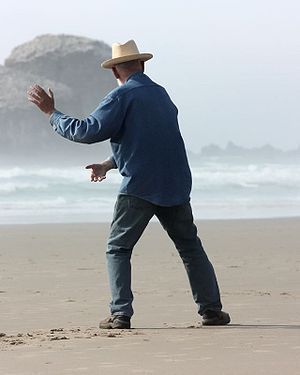
An elderly man performing tai chi in front of Haystack Rock in Cannon Beach, Oregon. (Photo credit: Wikipedia)
The other day, I walked into our local natural foods store for the first time (I know it’s hard to believe it was the first time, but I grow my own, and no, I live in Oregon, not Washington, so it’s not what you’re thinking) and wandered over to the essential oils section, looking for something I’d found online. When asked if I needed help, I replied, “I’ve looking for something to unblock my chi.” Yes, I did, I said that. It wasn’t Walmart, after all, it was a “natural” place. The salesperson handled it well, and we started looking at the oils promising “joyfulness,” and such. She suggested citrus, but it was apparent there wasn’t anything there for someone with stuck chi. Finally I showed her the word I had scrawled on my paper, for just such an occasion, and she hurried off to look it up in her computer.
On return, she told me they did carry that brand, and they could order it, but it would cost me. I thanked her and told her I would probably just order a sample online. I then moved onto another section of the store and several more people offered to help me. I abandoned the line about the stuck chi and just explained that I could not move my arm very far, maybe had a frozen shoulder, etc. I ended up buying several potent herbal tonics for inflammation and to promote flexible joints and some powdered magnesium.
Please don’t suggest I rub the area with coconut oil, I’m already doing that. I already get massages. Eventually I may go to the doctor. I’ve even considering acupuncture. In the meantime, anytime I see someone moving their left arm freely, dancing, doing yoga, tying on an apron string in the back, getting something off a shelf, I am envious.
This has happened once before, a few years ago, and I’m pretty sure it will pass. Until then, though, it is a pain. And also a good reminder of how we take even the smallest things for granted until one little thing stops working the way it should.
Take a moment today to be grateful for the small things, like the ability to turn your head and look behind you, or reaching from the front car seat to the back seat.
And in the meantime, cleaning out the garage and decluttering was also on the list of ways to unstick your chi. Now if only I could convince my husband.
I know I promised the response to Longfellow for this post. I will post it soon. I also keep forgetting to mention that Author S.Smith now has a Facebook page. Please like it! I also put a few pictures up on Pinterest if anyone wants to take a look.

January 25, 2013
But Her Feet Show It
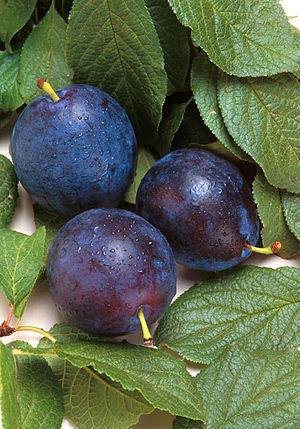
Bluebyrd plum (Photo credit: Wikipedia)
A couple of summers ago, to gain a few more credit hours (teachers have to do that), I took a class for reading and writing poetry. We learned about using various writing prompts to lead to poetry writing. One of my favorites was starting with someone else’s poem and then “answering” it.
So for a change of pace, I offer you my answer to William Carlos Williams. First, the original:
This Is Just to Say
I have eaten
the plums
that were in
the icebox
and which
you were probably
saving
for breakfast
Forgive me
they were delicious
so sweet
and so cold
And now mine:
Answering Williams
“This is just to say”
I was indeed
saving the plums
in the icebox
for breakfast.
If the thought even
occurred to you
that they were mine
(and obviously it did)
Why did
you
eat
them?
Forgive you?
I
think
not.
Next time, my contribution to the Village Blacksmith. 
–Author S


